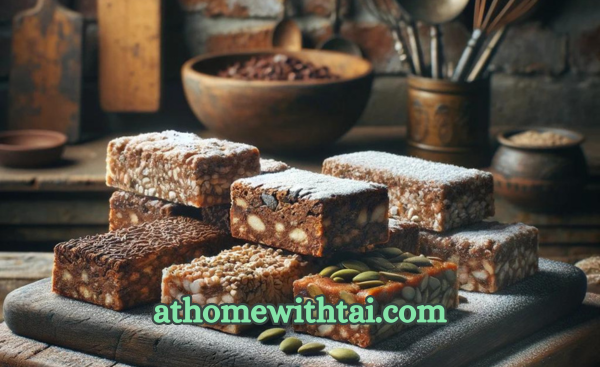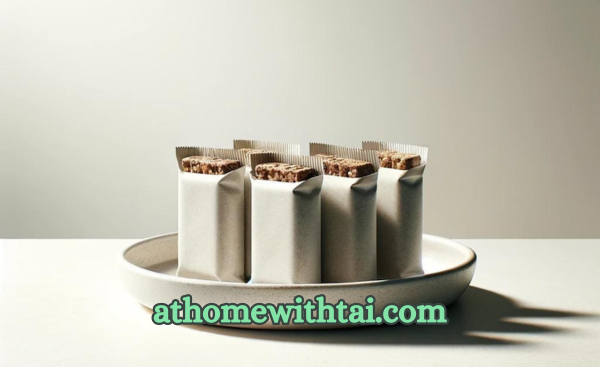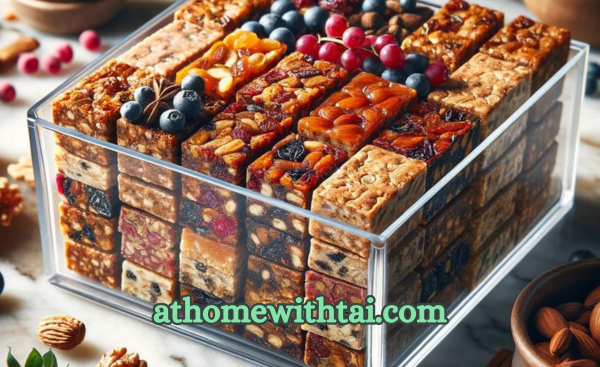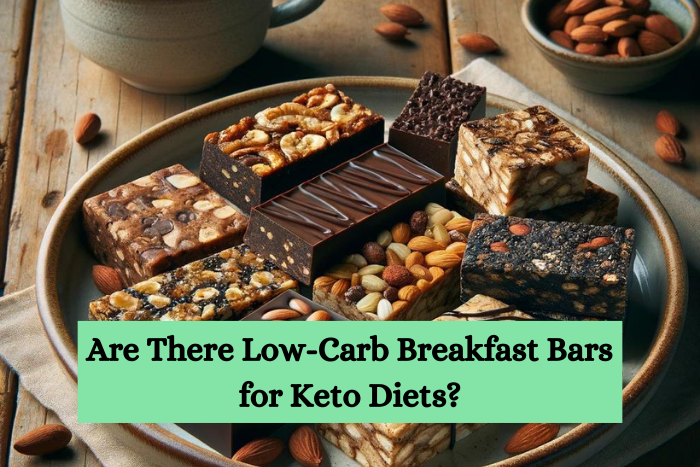- The keto diet emphasizes a high-fat, moderate-protein, and low-carb intake to induce a metabolic state known as ketosis, similar to how athletes might adjust their diets for peak performance by manipulating macronutrient ratios to optimize energy usage.
- Finding convenient, keto-friendly snacks, particularly breakfast options, is challenging due to the strict carb limits, akin to how someone with food sensitivities must meticulously read labels to avoid allergens.
- Genuine keto breakfast bars should have low net carbs primarily from fibers, high-quality fats like MCT oil or nuts, moderate clean proteins, and natural low-glycemic sweeteners, reflecting the careful balance of a diabetic’s diet to manage blood sugar levels.
- Many products market themselves as keto-friendly but may contain hidden carbs or ingredients that could disrupt ketosis, highlighting the importance of vigilance in ingredient selection, similar to how individuals with celiac disease must avoid gluten even in trace amounts.
- Making your own keto breakfast bars with nuts, seeds, and natural sweeteners offers a customizable and satisfying option, similar to home cooks preparing meals from scratch to ensure dietary compliance and preference satisfaction.
The keto diet centers on a high-fat, moderate-protein, and low-carbohydrate approach to eating. By significantly reducing carb intake, the body enters a metabolic state called ketosis, where it burns fat for fuel instead of glucose.
The balance of fats, proteins, and carbs is crucial; typically, around 70% of daily calories come from fat, 20-25% from protein, and only 5-10% from carbs. Sticking to this macronutrient distribution can be challenging, especially for individuals with active lifestyles who need quick, convenient options.
A common hurdle is finding suitable grab-and-go snacks that align with the strict carb limits of the keto diet. Many traditional breakfast options like cereal and toast are off the table, sending keto adherents on a quest for alternatives.
🥑 The Ideal Keto Macro Breakdown 🍗 |
||
|---|---|---|
| Fat | 70% | 🥥 High-quality sources like MCT oil, coconut oil |
| Protein | 20-25% | 🍳 Lean meats, fish, whey protein |
| Carbohydrates | 5-10% | 🥦 Low-glycemic vegetables, nuts, seeds |
| Brought to You by athomewithtai.com | ||
This is where low-carb breakfast bars come in. They offer a portable solution that fits within the keto framework.
But not all bars are created equal, and it’s easy to be misled by ‘keto-friendly’ labels that don’t always make the cut in terms of nutrition. That’s why it’s essential to understand what constitutes a genuinely keto-compatible breakfast bar.
Key Ingredients in Quality Keto Breakfast Bars

When you’re adhering to a ketogenic lifestyle, every bite counts. That’s why understanding the components that make up a genuine keto breakfast bar is crucial.
These bars should have a low net carb count, primarily from fibers that don’t spike your blood sugar levels. First up, fats are the cornerstone of any keto product.
You should look for bars that contain high-quality fats like MCT oil, coconut oil, or nuts. These help support ketosis and provide sustained energy.
Proteins also play a role but in moderation. Opt for bars with protein from clean sources like grass-fed whey or collagen, which support muscle recovery and satiety without overloading on carbs.
Fibers like chicory root or tapioca fiber are common in keto bars, aiding in digestion and helping keep the net carb count down. They’re essential for maintaining that fine balance on a keto diet.
Sweeteners must be chosen wisely. Natural, low-glycemic options such as erythritol, stevia, or monk fruit extract can sweeten the deal without the carb count creeping up.
Beware of sneaky carbs. Keto bars can sometimes contain additives or ‘hidden carbs’ that can disrupt ketosis.
Always scrutinize labels for ingredients like maltitol or dextrose, which can work against your low-carb goals. Remember, the best keto bars will have a clear ingredient list, with nutrient-rich, low-carb components supporting your dietary aims.
Keep these tips in mind as we explore top-notch keto breakfast bar options in the next section.
Top Picks: The Best Low-Carb Breakfast Bars for Keto Dieters

I scoured the market and taste-tested numerous brands to provide you with a recommendation of some of the best keto-friendly breakfast bars. Not all bars made the cut, but I focused on those that prioritized both taste and strict low-carb criteria.
One standout option is the Adonis Peanut Butter & Chocolate High Protein Keto Bar which manages to keep net carbs remarkably low. Similarly, the Keto Collective Keto Bars impress with their high-quality, sustainably sourced fats, and minimal sugar alcohols.
Don’t get swayed by flashy packaging or clever marketing. Always flip the bar over and scrutinize the nutrition facts and ingredient list.
Net carbs are your primary concern but also watch out for sugar alcohols and artificial ingredients, which could affect your blood sugar levels or kick you out of ketosis. For those of you who enjoy a bit of kitchen experimentation, making your own breakfast bars can also be quite rewarding.
My Final Thoughts
There are plenty of recipes online – look for one with ingredients like nuts, seeds, and natural sweeteners like stevia. Remember, the ideal keto breakfast bar fits snugly within your daily carb limit, aids in keeping you full, and aligns with your dietary principles.
How do you think the balance of convenience and nutritional integrity in keto-friendly products, like breakfast bars, impacts the overall success and sustainability of the keto diet in daily life? Let me know in the comments below!
Happy munching!
FAQ: Keto Breakfast Bars

Q: Can I eat breakfast bars on a keto diet?
- A: Yes, you can eat breakfast bars on a keto diet as long as they meet the keto macronutrient requirements, particularly being low in net carbs.
- A: Ensure the bars are high in healthy fats and contain moderate protein, with minimal sugar alcohols, or other ingredients that could impact ketosis.
Q: How do I choose a keto-friendly breakfast bar?
- A: Look for bars with high-quality fats like MCT oil, coconut oil, or nuts, and ensure they have a low net carb content that fits within your daily carb limit.
- A: Check the label for natural, low-glycemic sweeteners like stevia, erythritol, or monk fruit extract, and avoid bars with hidden sugars or high-carb fillers.
Q: Are sugar alcohols in keto bars bad for ketosis?
- A: Not all sugar alcohols have the same impact on blood sugar levels; erythritol and monk fruit extract are generally considered safe for ketosis, but it’s important to monitor your individual response.
- A: Some people may experience digestive issues or a spike in blood sugar with certain sugar alcohols, so it’s crucial to consume them in moderation and be aware of your body’s reactions.
Q: Can I make my own keto breakfast bars at home?
- A: Yes, making your own keto breakfast bars allows you to control the ingredients, ensuring they are keto-compliant and tailored to your taste preferences.
- A: There are numerous recipes available online that use ingredients like nuts, seeds, coconut oil, and natural sweeteners, providing a fun and creative way to stay on track with your keto diet.
Q: How do I calculate net carbs in keto breakfast bars?
- A: To calculate net carbs, subtract the grams of fiber and sugar alcohols (if they don’t impact your blood sugar) from the total carbohydrates listed on the nutrition label.
- A: It’s important to be cautious with sugar alcohols, as some can affect blood sugar levels. For the most accurate net carb count, focus on fiber and use your judgment with sugar alcohols based on how they impact you personally.
Q: What are some common pitfalls to avoid with store-bought keto bars?
- A: Be wary of bars that claim to be keto-friendly but are high in added sugars or contain ingredients like maltitol, which can spike your blood sugar.
- A: Also, avoid bars that rely heavily on processed proteins or artificial ingredients, as these can disrupt your health goals and ketosis over time.

I’m Diane, a culinary enthusiast who loves to share my cooking adventures and knowledge with you.
This blog is my cozy corner on the internet where I unravel the secrets behind making everyday cooking simple, enjoyable, and downright delicious.
Whether it’s unlocking the flavor potential in chicken or figuring out why your mashed potato cakes won’t hold together, I’m here to guide you through.
Join me as we explore various dishes, solve common kitchen dilemmas, and discover new recipes that will make you fall in love with cooking all over again.
Cooking is an adventure that’s best shared, so let’s get started!







